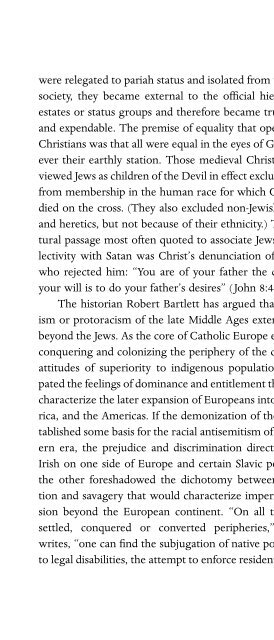Racism - A Short History - George M Fredrickson.pdf - WNLibrary
Racism - A Short History - George M Fredrickson.pdf - WNLibrary
Racism - A Short History - George M Fredrickson.pdf - WNLibrary
Create successful ePaper yourself
Turn your PDF publications into a flip-book with our unique Google optimized e-Paper software.
TWO The Rise of Modern <strong>Racism</strong>(s)<br />
peddling or begging at a near destitution level. Above them<br />
was a smaller middle stratum of small-scale merchants, cattle-dealers,<br />
tavern-keepers, rabbis, teachers, and doctors....”<br />
7 Because of the marginal and relatively fixed position<br />
of western and central European Jewry, a “Jewish<br />
question” had not yet emerged, and outbreaks of virulent<br />
and aggressive antisemitism, such as pogroms and accusations<br />
of ritual murder, were fairly rare. There was as yet no<br />
clear conception of a Jewish race with innate characteristics<br />
that made them a despised and eternal Other for non-Jewish<br />
Europeans.<br />
The scientific thought of the Enlightenment was a precondition<br />
for the growth of a modern racism based on<br />
physical typology. In 1735, the great Swedish naturalist Carl<br />
Linnaeus included humans as a species within the primate<br />
genus and then attempted to divide that species into varieties.<br />
This early stab at the scientific classification of human<br />
types included some mythical and “monstrous” creatures;<br />
but the durable heart of the schema was the differentiation<br />
Linnaeus made among Europeans, American Indians,<br />
Asians, and Africans. Although he did not explicitly rank<br />
them, Linnaeus’s descriptions of the races clearly indicated<br />
his preferences. Europeans he described as “acute, inventive....Governed<br />
by laws.” Blacks, on the other hand, were<br />
“crafty, indolent, negligent....Governed by caprice.” 8<br />
The most authoritative classification of the races produced<br />
by the Enlightenment was Johann Friedrich Blumenbach’s<br />
On the Natural Varieties of Mankind, published in 1776.<br />
Rightly deemed the father of physical anthropology, Blumenbach<br />
had no doubt that all humans belonged to a single<br />
species and that they had a common remote ancestry. He<br />
56
















